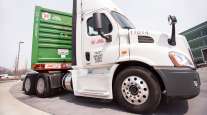Top Freight Executives Leery of Trade Fight With Mexico

This story appears in the Feb. 20 print edition of Transport Topics.
WASHINGTON — A disruption of trade agreements with Mexico has the potential of hindering the country’s flow of products with its southern neighbor, freight executives told a Senate panel Feb. 15.
Christopher Lofgren, CEO of Schneider, and Matthew Rose, executive chairman of BNSF Railway Co., cautioned against engaging in antagonistic trade disputes with Mexico, responding to New Mexico Sen. Tom Udall (D), who said he shared a similar view.
“Clearly, we have significant operations that move freight both into Mexico and out of Mexico. And clearly these kinds of issues are not going to be helpful to our business in terms of reducing the flow of goods,” Lofgren told the Senate Commerce subcommittee on surface transportation. “There’s no doubt that, if the path that we’re on here continues, we’ll see reductions in the amount of business that we’re going to conduct between the U.S. and Mexico.”
The trucking firm has customers with manufacturing facilities in Mexico that bring or build component parts that require assembly in the United States, Lofgren explained. Schneider ranks No. 7 on the Transport Topics Top 100 list of the largest U.S. and Canadian for-hire carriers.
After pressed by Udall, Rose stressed: “We don’t need trade wars.”
Several freight companies, from UPS Inc. to FedEx Corp., have shared concerns about the economic effects a do-over of the North American Free Trade Agreement could have. Nafta is a Clinton-era accord negotiated by Canada, Mexico and the United States.
“I don’t know that losing it completely will solve any problems. I think they much prefer more access to trade, not less. So I hope that we don’t get rid of all of the programs that are in place, that maybe we work with the partners to figure out what isn’t working,” Nancy O’Liddy, vice president of government affairs for the Transportation Intermediaries Association, a broker trade organization, told TT.
“If we do a 20% tax on exports from Mexico, the only people that that’s really going to hurt are consumers because that’s really going to come back on us,” O’Liddy said.
President Trump has described Nafta as an unfair deal for U.S. consumers and companies, and he signaled an interest in imposing a 20% tax on Mexican imports. The Trump administration and top tax policymakers in Congress have suggested they intend to unveil a business tax reform package this year.
A coalition of at least 16 House Democrats, led by Oregon’s Peter DeFazio, announced on Feb. 16 they will file a “Blueprint for America’s New Trade Policy” that urges Trump to fulfill his campaign promises and negotiate a thorough overhaul of Nafta or withdraw from the 1994 agreement.
DeFazio, the ranking Democrat on the House Transportation and Infrastructure Committee, included in the resolution a provision on Mexican trucks saying that a new Nafta should return to a limited free trade zone on both sides of the border, where southbound trucks would hand off trailers to Mexican carriers and northbound commercial vehicles would drop trailers for U.S. companies.
“We had a system that worked well,” DeFazio said at a press conference. Backed by representatives of the AFL-CIO and the Sierra Club, the House Democrats said Nafta has been “devastating” to U.S. workers and to North America’s environment and has created “a race to the bottom” on wages and environmental protection.
Although Trump has relied heavily on Republican votes — especially in the Senate — during the early days of his administration, DeFazio said his coalition can offer needed support to the administration. He said House Speaker Paul Ryan (R-Wis.), Ways and Means Committee Chairman Kevin Brady (R-Texas) and Senate Majority Leader Mitch McConnell (R-Ky.) are all supporters of free trade who will fight Trump “tooth and nail” on the issue.
DeFazio said Mexican trucks and their drivers do not have to follow U.S. safety standards during the Mexican segments of their trips, so their access to U.S. roads should be limited.
Democratic House members Reps. Rosa DeLauro of Connecticut, Debbie Dingell of Michigan, Daniel Lipinski of Illinois, Rick Nolan of Minnesota, Jan Schakowsky of Illinois and Bobby Scott of Virginia joined DeFazio in a House Transportation and Infrastructure subcommittee room and said Nafta has led to U.S. job losses, business failures and trade deficits.




